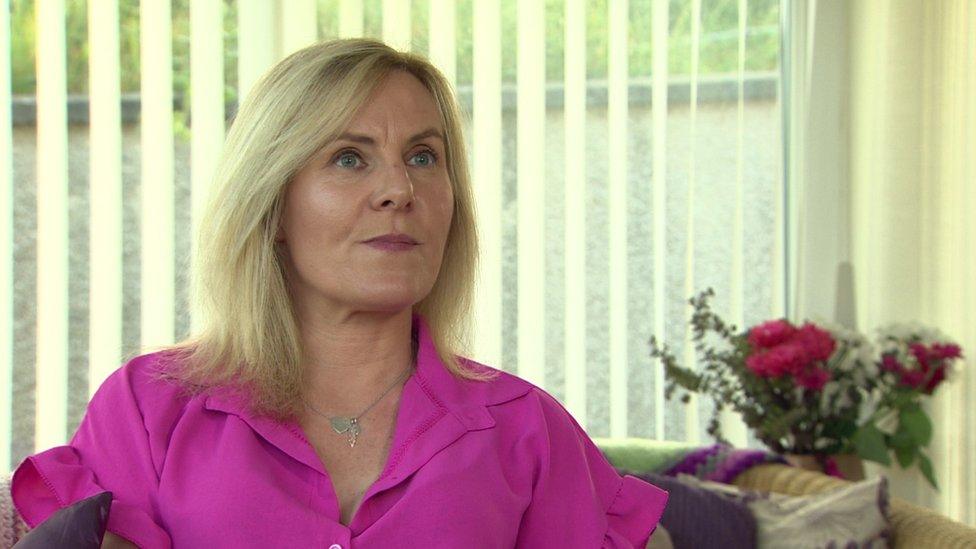Jeni Larmour: Mother of drug death student granted case review
- Published

Jeni Larmour was deputy head girl at the Royal School Armagh in the 2019-20 academic year
The mother of a County Armagh teenager who died after taking ketamine has said the resulting judicial process has been "traumatic".
Sandra Larmour, from Newtownhamilton, County Armagh, has been granted a review of the legal proceedings by the Crown Prosecution Service (CPS).
At the time of her death last October, Jeni Larmour was described as a model pupil by her former school principal.
The 18-year-old had been a deputy head girl at the Royal School Armagh.
But within hours of moving into halls of residence at Newcastle University she was dead.
A post-mortem examination found she had died after taking ketamine, a drug used in medicine as an anaesthetic.
Last week one of Ms Larmour's flatmates, 19-year-old Kavir Kalliecharan from Leeds, was sentenced to two years on conditional discharge after pleading guilty possessing Class A and Class B drugs.
'Not there to tell her story'
In her first broadcast interview, Mrs Larmour told BBC News NI that Kalliecharan was not cross-examined in spite of claiming her daughter had supplied the drugs.
"The solicitor was given a 10-minute opportunity to paint his client in a whiter-than-white situation," she said.
"The inference was that Jeni had been in Newcastle for a couple of days, which would have given her opportunity to have perhaps purchased some drugs."
However, Mrs Larmour said she travelled to the city with her daughter, who was with her "at all times" until the night of her death.
She said police with sniffer dogs only found evidence of drugs in Kalliecharan's room and no evidence was found anywhere else.
"Jeni wasn't there to tell her story - she was dead," she said, adding that she had no reason to doubt her daughter.
Mrs Larmour said Kalliecharan's "merits, his excelling and his background" were discussed in court but "there was nobody who stood up and talked about the excellent person that Jeni was and how she had excelled at everything she had done".

Sandra Larmour has written to the CPS with queries about the case involving Kavir Kalliecharan
She said she was not allowed to give a victim impact statement in court in spite of a number of Jeni's friends attending counselling after her death.
She has subsequently written to the CPS with queries about the lack of challenge to the defendant's solicitor.
"I will not stop until I get satisfaction that I have done as much as I can to clear Jeni's name and ensure justice is served," said Mrs Larmour.
"The last few days have been very, very traumatic, very heart-breaking but I do believe in my heart that I will get justice in the end.
"I've said from the start I'll leave no stone unturned and I mean that."
'Between two stools'
Solicitor Paul Dougan told BBC News NI that facts presented by police to the CPS resulted in charges which focused exclusively on drug possession, a charge which did not relate directly to Ms Larmour's death.
Mr Dougan said the "tragedy" of the case was that it "effectively fell between two stools".
He said the prosecution of the case for drugs possession "left out the family who felt there was a victim of wrongdoing on someone's part".
Ellen Fearon, the president of the National Union of Students and Union of Students in Ireland (NUS-USI) said the case highlighted the need for bigger changes in universities' approach to drug use on campus.
She questioned whether a zero-tolerance approach was fit for purpose.
She said the approach caused students to "fear they might be punished" if they reached out for support, adding that it was "in the best interest of anyone to move away from that moralistic, punitive stand".
"We need better education around safe drug use and we need to develop drug harm reduction policies and interventions to reduce the negative outcomes of student drug use," she said.
Related topics
- Published5 October 2020
